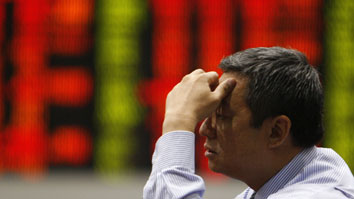Into the land of the unknown
前途未卜
Global market turmoil continues after the rejection of the mortgage-rescue plan in America
美國(guó)救市計(jì)劃遭拒后全球市場(chǎng)繼續(xù)混亂

Reuters
HOW many votes in Congress will the latest financial upheaval change? That is the calculus underway in Washington, DC, after the House of Representatives defeated the proposed $700 billion mortgage-rescue plan by 228 to 205 on Monday September 29th. Democrats backed it by 140 votes to 95, while Republicans opposed it by 133 to 65.
最近的金融巨變將改變多少國(guó)會(huì)的選票?這是繼9月29日周一眾議院以228票反對(duì):205票支持挫敗7000億美元救市計(jì)劃之后,華盛頓正在進(jìn)行的計(jì)算。對(duì)此項(xiàng)救市計(jì)劃,民主黨140票支持:95票反對(duì),而共和黨則是133票反對(duì):65票支持。
Bankers had been under no illusions that the tweaked Paulson plan would cure all the financial system’s ills. But most had seen it as a step in the right direction, and had expected it to pass. Its rejection sent stockmarkets into freefall. The Dow Jones Industrial Average finished down by 7%, and suffered its biggest-ever points loss. Perhaps fittingly in an economy that is in danger of sliding into depression, the only stock among the 500 in the S&P index that finished higher was Campbell’s Soup. The S&P closed 29% below its peak. Reflecting fears that consumer demand will wilt, shares of Apple Computer, creator of the iPhone, fell by 18%. The rout continued in Asia and Europe on Tuesday morning.
銀行家們對(duì)妥協(xié)后的鮑爾森的救市計(jì)劃會(huì)治愈金融系統(tǒng)的疾患不抱幻想。但是他們中的大多數(shù)認(rèn)為該救市計(jì)劃是往正確的方向前進(jìn),并希望它能夠得以通過(guò)。救市計(jì)劃遭拒引起股市重挫。道瓊斯工業(yè)平均指數(shù)下跌7%,創(chuàng)歷史最大點(diǎn)數(shù)跌幅。或許,對(duì)一個(gè)有著滑向蕭條之危險(xiǎn)的經(jīng)濟(jì)體來(lái)說(shuō),標(biāo)準(zhǔn)普爾500指數(shù)股票里收盤唯一上漲的一只股票是 美國(guó)湯品生產(chǎn)商金寶湯(Campbell’s Soup)就是再平常不過(guò)的事情了。標(biāo)準(zhǔn)普爾500指數(shù)比其歷史峰值跌29%收盤。iPhone開發(fā)者蘋果公司的股票下跌18%,反映出市場(chǎng)對(duì)消費(fèi)者需求 將會(huì)萎縮的恐慌。美國(guó)股市收盤后,亞洲股市還在下挫,歐洲股市的下挫則延續(xù)到周二早晨。
Worse, credit markets, already dysfunctional, were brought close to breaking point. Banks grew even less willing to lend to each other on Monday, and money-market funds fled anything with a whiff of risk. Some corporations are struggling to roll-over commercial paper, short-term debt issued to finance working capital, payroll payments and the like. In an effort to keep money markets from drying up, the Federal Reserve has doubled the size of a vital lending facility for banks, to $300 billion, and expanded agreements with other central banks that funnel dollars to lenders abroad.
更糟的是,已經(jīng)運(yùn)轉(zhuǎn)不良的信貸市場(chǎng)瀕臨崩潰。周一,銀行更為不愿互相拆借,一有風(fēng) 吹草動(dòng),貨幣基金就出逃任何投資項(xiàng)目。一些公司苦苦掙扎于結(jié)轉(zhuǎn)商業(yè)票據(jù),發(fā)行短期債券來(lái)籌措流動(dòng)資金,支付工資和其他費(fèi)用。在維持貨幣市場(chǎng)流動(dòng)性的努力 中,美聯(lián)儲(chǔ)把一項(xiàng)對(duì)銀行的關(guān)鍵貸款供應(yīng)規(guī)模翻番,達(dá)到3000億美元,并且延伸了與其他央行關(guān)于它們?yōu)樵诤M饨?jīng)營(yíng)的美國(guó)的銀行注資的協(xié)議。
These unprecedented injections are aimed at easing concerns that weak participants in the interbank market will fail to honour their debts. But many banks are now assumed to be not only illiquid but insolvent. Last week Washington Mutual, a thrift saddled with rotten mortgages, became the largest-ever American lender to fail. And on Monday Citigroup agreed to buy most of the assets of Wachovia, an even bigger American bank, in a deal brokered by regulators. The pain has suddenly grown much more intense in Europe, too.
這些空前的注資舉措目的在于緩解憂慮,這種憂慮是:孱弱的參與者在同業(yè)拆借市場(chǎng)上 無(wú)能力償還其所欠債務(wù)。但是現(xiàn)在許多銀行被認(rèn)為不僅僅是流動(dòng)性差,而且是無(wú)償付能力。上周,不堪承受大量不良抵押的一家儲(chǔ)蓄銀行——華盛頓互惠銀行 (Washington Mutual)破產(chǎn),成為美國(guó)有史以來(lái)最大的倒閉銀行。周一花旗集團(tuán)同意購(gòu)買大部分美聯(lián)(Wachovia)資產(chǎn),美聯(lián)是一家比華盛頓互惠銀行規(guī)模更大的 銀行,此項(xiàng)交易由監(jiān)管方撮合。金融危機(jī)的痛楚在歐洲也急劇增強(qiáng)。











